
The men's épée was one of four fencing events on the Fencing at the 1908 Summer Olympics programme. The competition was held from 17 to 24 July 1908 at the Franco-British Exhibition fencing grounds. There were 85 competitors from 13 nations. Each nation could enter up to 12 fencers. The medals were swept by the French fencers, who also took the gold medal in the team épée event. Gaston Alibert was the gold medalist, with Alexandre Lippmann taking silver and Eugene Olivier bronze. Officially, it was the second consecutive medal sweep in the event, though two of the three "Cuban" fencers who medaled in 1904 were actually American.

The men's foil was one of eight fencing events on the fencing at the 1964 Summer Olympics programme. It was the fourteenth appearance of the event. The competition was held from October 13 to October 14, 1964. 55 fencers from 21 nations competed. Nations had been limited to three fencers each since 1928. The event was won by Egon Franke of Poland, the nation's first victory in the men's foil. France returned to the podium after a one-Games absence, with Jean-Claude Magnan taking silver and Daniel Revenu the bronze.

The men's épée was a fencing event held as part of the Fencing at the 1912 Summer Olympics programme. It was the fourth appearance of the event, which had been introduced in 1900. The competition was held from 11 to 13 July at the Östermalm Athletic Grounds. There were 93 competitors from 15 nations. Each nation could enter up to 12 fencers. The event was won by Paul Anspach of Belgium. His countryman Philippe le Hardy took bronze. Silver went to Denmark's Ivan Joseph Martin Osiier, the only medal won by the perennial Olympian who competed in seven Games over 40 years. The medals were the first in the men's épée for both nations.

The amateur foil competition had 54 fencers from 10 nations compete. There was no limit on the number of fencers per nation; 39 of the 54 competitors were French. For the first round, quarterfinals, and repechage, skill and art with the foil was more important to advancing than winning the bout. The event was swept by French fencers: Émile Coste, Henri Masson, and Marcel Boulenger took the top three places. It was the second consecutive Games that France had taken the top two ranks
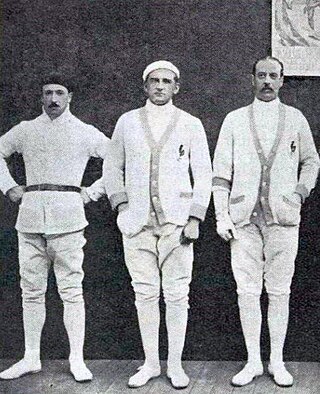
The men's épée was a fencing event held as part of the fencing at the 1920 Summer Olympics programme. It was the fifth appearance of the event. A total of 80 fencers from 13 nations competed in the event, which was held from August 20 to 23, 1920. Each nation was limited to eight fencers, down from 12 in 1908 and 1912. Of the six fencing events, the only one in which Nedo Nadi did not win a gold medal was the one in which he did not compete. Instead, a trio of Frenchmen swept the medals. It was Lippmann's second silver medal in the event, he having previously taken second in 1908; he was the second man to win multiple medals in the individual épée.
The men's épée was one of seven fencing events on the Fencing at the 1924 Summer Olympics programme. It was the sixth appearance of the event, which had not been on the programme in 1896. The competition was held from Wednesday, July 10, 1924 to Thursday, July 11, 1924. 67 fencers from 18 nations competed. Nations were limited to four competitors each. The event was won by Charles Delporte of Belgium, the nation's second victory in the individual épée. Silver went to Roger Ducret of France. Nils Hellsten earned Sweden's first medal in the event with his bronze.

The men's foil was one of seven fencing events on the Fencing at the 1928 Summer Olympics programme. It was the seventh appearance of the event. The competition was held from 31 July 1928 to 1 August 1928. 54 fencers from 22 nations competed. For the third straight Games, the limit of fencers per nation was reduced. The event was won by Lucien Gaudin of France, the nation's second consecutive and fourth overall victory in the men's foil. Erwin Casmir earned silver to give Germany its first medal in the event. Giulio Gaudini of Italy took bronze.

The men's épée was one of seven fencing events on the fencing at the 1936 Summer Olympics programme. It was the ninth appearance of the event. The competition was held from 9 August 1936 to 11 August 1936. 68 fencers from 26 nations competed. Nations were limited to three fencers. The event was won by Franco Riccardi of Italy, the nation's second consecutive victory in the men's épée. Riccardi's teammates Saverio Ragno and Giancarlo Cornaggia-Medici took silver and bronze, respectively, to give Italy a medal sweep—Italy's first and the fourth overall in the event. Cornaggia-Medici, who had won gold in 1932, became the fourth man to win multiple medals in the individual épée. For the first time, France competed in the event but did not win any medals.
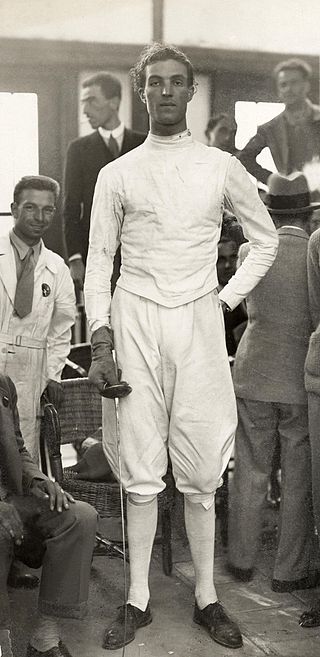
The men's foil was one of seven fencing events on the fencing at the 1936 Summer Olympics programme. It was the ninth appearance of the event. The competition was held from 5 August 1936 to 6 August 1936. 62 fencers from 22 nations competed. Nations were limited to three fencers. The event was won by Giulio Gaudini of Italy, the nation's second consecutive and fourth overall victory in the men's foil. Gaudini, who had won bronze medals in 1928 and 1932, was the first man to win three medals in the event. His countryman Giorgio Bocchino took bronze. Edward Gardère put France back on the podium after a one-Games absence.

The men's épée was one of seven fencing events on the fencing at the 1948 Summer Olympics programme. It was the tenth appearance of the event. The competition was held from 7 August 1948 to 9 August 1948. 66 fencers from 25 nations competed. The event was won by Luigi Cantone of Italy, the nation's third consecutive victory in the men's épée. Italy also earned its third consecutive bronze medal in the event, with Edoardo Mangiarotti's third-place finish. Between the two Italians was Oswald Zappelli of Switzerland, taking the silver medal.
The women's foil was one of seven fencing events on the fencing at the 1948 Summer Olympics programme. It was the fifth appearance of the event. The competition was held from 31 July 1948 to 2 August 1948. 39 fencers from 15 nations competed.

The men's sabre was one of seven fencing events on the fencing at the 1948 Summer Olympics programme. It was the eleventh appearance of the event. The competition was held from 12 August 1948 to 13 August 1948. 60 fencers from 24 nations competed. Nations were limited to three fencers each. The event was won by Aladár Gerevich, the fifth of nine straight Games in which a Hungarian would win the event. Gerevich became the third man to win multiple medals in the individual sabre, adding to his 1936 bronze. Vincenzo Pinton of Italy took silver and Pál Kovács of Hungary took bronze; it was the third straight Games where the sabre podium was Hungary-Italy-Hungary.

The men's épée was one of seven fencing events on the fencing at the 1952 Summer Olympics programme. It was the eleventh appearance of the event. The competition was held from 27 July 1952 to 28 July 1952. 76 fencers from 29 nations competed. Nations were limited to three fencers each. The event was won by Edoardo Mangiarotti of Italy, the nation's fourth consecutive victory in the men's épée. It was also the fourth consecutive year that Italy had at least two fencers on the podium in the event, as Edoardo's brother Dario Mangiarotti took silver. Bronze went to Oswald Zappelli of Switzerland. Zappelli and Edoardo Mangiarotti had faced each other in a barrage for silver and bronze medals in 1948, which Zappelli had won; the two men were the fifth and sixth to earn multiple medals in the event.
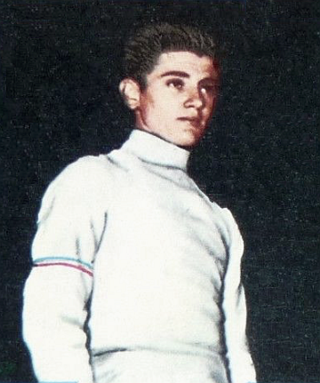
The men's foil was one of seven fencing events on the fencing at the 1952 Summer Olympics programme. It was the eleventh appearance of the event. The competition was held from 23 July 1952 to 24 July 1952. 61 fencers from 25 nations competed. All three medallists were left-handed. Nations were limited to three fencers each since 1928. The event was won by Christian d'Oriola of France, the nation's second consecutive victory in the men's foil and sixth overall. D'Oriola was the fifth man to win multiple medals in the event. The silver and bronze medals were won by Edoardo Mangiarotti and Manlio Di Rosa of Italy.
The women's foil was one of seven fencing events on the fencing at the 1952 Summer Olympics programme. It was the sixth appearance of the event. The competition was held from 26 July 1952 to 27 July 1952. 37 fencers from 15 nations competed.

The men's sabre was one of seven fencing events on the fencing at the 1952 Summer Olympics programme. It was the twelfth appearance of the event. The competition was held from 31 July 1952 to 1 August 1952. 66 fencers from 26 nations competed. Nations were limited to three fencers each. The event was won by Pál Kovács, the sixth of nine straight Games in which a Hungarian would win the event. Kovács became the fourth man to win multiple medals in the individual sabre, adding to his 1948 bronze. Hungary swept the medals in the event for the second time. Aladár Gerevich's silver completed a set of three different color medals in the event, the first man to win three medals in individual sabre. Tibor Berczelly earned bronze.

The men's foil was one of seven fencing events on the fencing at the 1956 Summer Olympics programme. It was the twelfth appearance of the event. The competition was held on 26 November 1956. 32 fencers from 14 nations competed. Nations had been limited to three fencers each since 1928. The event was won by Christian d'Oriola of France, the second man to successfully defend an Olympic title in the foil and second man to win three medals in the event. It was France's third consecutive and seventh overall victory in the event. As in 1952, the next two spots were taken by Italians, this time Giancarlo Bergamini and Antonio Spallino.

The men's épée was one of seven fencing events on the fencing at the 1956 Summer Olympics programme. It was the twelfth appearance of the event. The competition was held on 30 November 1956. 41 fencers from 18 nations competed. Nations were limited to three fencers each. The event was won by Carlo Pavesi of Italy, the nation's fifth consecutive victory in the men's épée. In all five of those Games, Italy earned at least two medals in the event; this was the second sweep during that period for Italy. Giuseppe Delfino was the silver medalist while Edoardo Mangiarotti took bronze. It was Mangiarotti's third medal in the event, along with gold in 1952 and another bronze in 1948; he was the first man to win three medals in the individual épée.
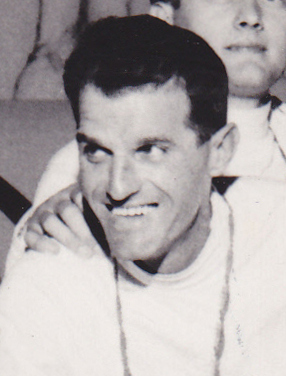
The men's sabre was one of seven fencing events on the fencing at the 1956 Summer Olympics programme. It was the thirteenth appearance of the event. The competition was held on 5 December 1956. 35 fencers from 17 nations competed. Nations had been limited to three fencers each since 1928. The event was won by Rudolf Kárpáti, the seventh of nine straight Games in which a Hungarian would win the event. Jerzy Pawłowski of Poland took silver and Lev Kuznetsov of the Soviet Union took bronze, the first medals in the event for each nation and the first time since 1924 that any nation other than Hungary and Italy earned a medal in the men's sabre.
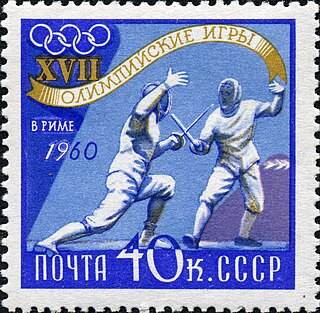
The men's foil was one of eight fencing events on the fencing at the 1960 Summer Olympics programme. It was the thirteenth appearance of the event. The competition was held from 29 – 30 August 1960. 78 fencers from 31 nations competed. Nations had been limited to three fencers each since 1928. The event was won by Viktor Zhdanovich of the Soviet Union, with his countryman Yury Sisikin the runner-up; they were the nation's first medals in the event. The Soviets nearly swept the medals, with Mark Midler advancing to a three-man barrage for third place before finishing in fifth place. Albie Axelrod's bronze put the United States on the podium for the event for the first time since 1932. Traditional powers Italy and France, who between them had won 11 of 12 gold medals and 9 of 12 silver, were kept off the podium entirely.

















